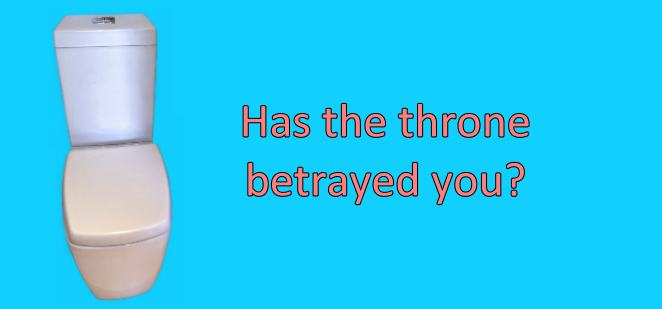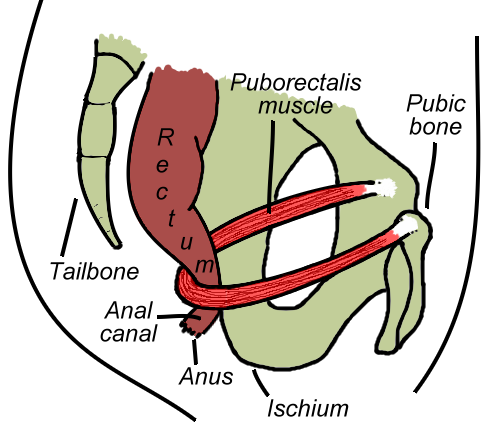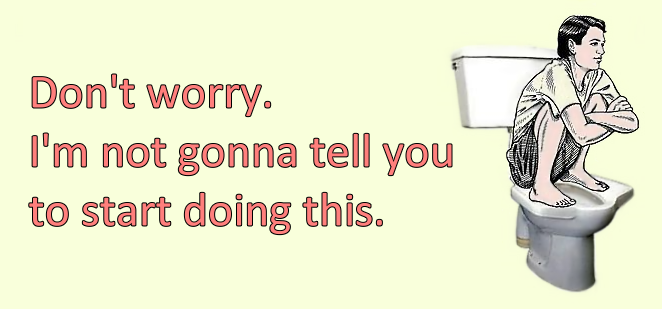Ah, pooping. Defecating. Moving your bowels. Taking a dump. Dropping a load. A very private matter, perhaps even taboo. We all do it, but we are pretty ashamed of the act and shy away from talking about it. If confronted in conversation, we mask it with laughter and jokes. Which is all fine, but before you leave or start cracking jokes… are you doing it wrong? “How can you even do it wrong?” I imagine you ask. Well, it’s not really your fault if you live in a society where sitting toilets are king.

Adapted from CC4.0 source by Amin.
 Schematic representation of the pelvic area. Notice how, when standing straight, the puborectalis muscle helps maintain a ~90° angle between the anal canal and the rectum.
Schematic representation of the pelvic area. Notice how, when standing straight, the puborectalis muscle helps maintain a ~90° angle between the anal canal and the rectum.
I’m afraid your toilet has indeed betrayed you. The evidence suggests that sitting while doing number two is not the best option compared to squatting, the position humans have been using since their origin. This has to do with some of the ways our body helps us control when to go potty, which include the puborectalis voluntary muscle compressing and bending the anorectal canal [1]. When you are standing straight, the anorectal canal is bent at around 90 degrees (see image to the right), helping keep faeces in the rectum. Flexing the hips increases this angle, facilitating the passing of faeces so they can be expelled through the anus. In particular, sitting increases the angle, but squatting maximises it, allowing for reduced straining when defecating [2-3].
For example, one study recruited 28 healthy volunteers to use normal sitting toilets, low sitting toilets and squatting toilets (all individuals carried out six bowel movements in all three positions) and found that subjects reported a significantly reduced amount of time needed to achieve “sensation of satisfactory bowel emptying” plus lower levels of straining when defecating in the squatting position [4]. A similar Japanese study of 6 subjects found the same general results: squatting achieved the straightest form of the rectoanal canal, which significantly reduced straining measurements [2].
Some in the medical community also claim there’s reason to believe defecating while in the sitting position increases the chances of suffering diseases such as appendicitis, Crohn's disease, acid reflux (GERD), haemorrhoids or colon cancer [5] (see table below). The claim is that by sitting you are not properly squeezing the colon clean of stool and may even be exerting pressure backwards. This would push faecal matter into the appendix or back past the ileocecal valve (separating the ileum, the last portion of the small intestine, from the colon), which may promote the inflammation of the appendix or ileum. The improper clearing of the colon is also claimed could be contributing to inflammation and cancer. The increased straining and internal pressures created compared to defecating while squatting are also hypothesised to be contributing to inflammation of the haemorrhoids and to GERD by damaging the cardiac sphincter.

Brief explainer for the aforementioned diseases.
Proponents of this connection point to increased rates of such diseases in the Western world [6-7], where sitting toilets are the rule, but others respond there’s no body of evidence to support the claims of improper clearing or backwash [8]. There could be many other contrasts in diet or lifestyle to explain these differences in disease rates between the West and the typically underdeveloped regions of the world where squatting is the norm, after all. For example, haemorrhoids have long been associated with constipation [9-10] and a recent study suggests slow colon transit times may be associated with colon diverticula, cancer, appendicitis and haemorrhoids [11].
After going through the scientific literature I found one study which analysed defecation posture in 100 colorectal cancer patients (plus 100 controls) in Iran. The researchers found no significant differences between patients with a history of squatting vs sitting when passing faeces and risk of colorectal cancer [12]. There have furthermore been some studies analysing haemorrhoids and toilet posture, but the connection remains ambiguous [13]. The truth is there is currently no evidence of any causal link between the incidence of any aforementioned disease and defecation posture, mainly because virtually no studies have been conducted for us to say one way or the other. It should also be noted that the main proponent I’ve been citing so far who links sitting defecation to all these numerous diseases, Jonathan Isbit, is also selling a toilet solution [14], which gives him an obvious conflict of interest.

Adapted from public domain source by Jonathan108.
So, should you smash your toilet and throw the pieces out? You could, but it’s not necessary. A simpler solution if you want to change your posture is to use a feet-rising stool. Some are sold commercially for this purpose but you can really just place anything that can act as a foot rest, lifting your feet from the ground by around 20 centimetres or so (talking about adult height here). By rising your feet and bending your torso forwards you can achieve the same anatomical effect as squatting, or at least very close to it. If you are a lady, some studies suggest squatting can also help with urination [15].

Adapted from source by Jasper Greek Golangco.
There are certain segments of the population, such as the elderly and people with hypo- or hypertension or other cardiovascular problems, who have a higher risk of suffering syncope (loss of consciousness) or heart attacks when defecating [16-17]. This is related at least in part with the Valsalva manoeuvre, which involves trying to exhale while closing your airways. The manoeuvre, which can be safely invoked during certain medical tests or physical training, can occur in a more involuntary fashion during defecation and become too intense, repetitive and protracted [16]. The maneuver increases thoracic and abdominal pressure but also intravenous and intra-arterial pressures and can affect coronary and cerebral blood flow, which can explain loss of consciousness, heart attacks and other vascular events [18-19] Furthermore, a study coming from India showed that squatting can increase blood pressure and that around a third of strokes occur when squatting over the toilet in hypertensive patients [20].
As we can see, cardiovascular effects have been described both when sitting and squatting, but the evidence shows that reducing straining during defecation will reduce the intensity and number of Valsalva manoeuvre repetitions. So, irrespective of whether you sit or squat, you can achieve a reduction in straining, and thus in Valsalva manoeuvres, with a well-balanced diet that includes enough fibre (think seeds, nuts, fruits and vegetables), a longstanding medical recommendation [8]. Consuming appropriate amounts of dietary fibre also has other health benefits related to constipation, diabetes, cancer and beyond [21] You may follow this link to get a quick overview and dietary advice to increase your fibre consumption.
In conclusion, if you are a healthy individual, consuming enough fibre and squatting (or using a footrest) when defecating will reduce straining and increase the speed and overall satisfaction with the experience. For the elderly, cardiovascular patients and people with chronic hypo- or hyper-tension, the evidence suggests that reducing the intensity and number of Valsalva manoeuvres during defecation is probably advisable, but further research is needed with respect to posture for different types of patients. In issues of health always remember: when in doubt, consult a certified physician.
References:
[1] The puborectalis muscle. Neurogastroenterol Motil. 2005; 17 (Suppl 1):68-72
[2] Influence of body position on defecation in humans. Low Urin Tract Symptoms. 2010; 2(1):16-21
[3] Primary constipation: an underlying mechanism. Med Hypotheses. 1989; 28(2):71-3
[4] Comparison of straining during defecation in three positions: results and implications for human health. Dig Dis Sci. 2003; 48(7):1201-5
[5] Preventing diseases of civilization. J Pediatr Surg. 2018; 53(6):1261
[6] Out of Africa: Insights from a prospective pediatric surgery database. J Pediatr Surg. 2017; pii: S0022-3468(17)30631-0
[7] The war on cancer--failure of therapy and research: discussion paper. J R Soc Med. 1991; 84(2):95-8
[8] Squatting at pottying (or defecation if you like that better) and the origins of noncommunicable diseases. J Pediatr Surg. 2018; 53(6):1262
[9] Risk factors associated with hemorrhoidal symptoms in specialized consultation. Gastroenterol Clin Biol. 2005; 29(12):1270-4
[10] Associations between hemorrhoids and other diagnoses. Dis Colon Rectum. 1998; 41(12):1534-41
[11] Faecal retention: a common cause in functional bowel disorders, appendicitis and haemorrhoids--with medical and surgical therapy. Dan Med J. 2015; 62(3). pii: B5031
[12] Squatting and risk of colorectal cancer:a case-control study. Middle East J Dig Dis. 2012; 4(1):23-7
[13] Squatting for the prevention of haemorrhoids? Townsend Letter for Doctors & Patients. 1996; 159:66-70
[14] Don’t just sit there! Slate 2010
[15] Posture and micturition: does it really matter how a woman sits on the toilet? Int Urogynecol J. 2014; 25(8):1015-21
[16] Cardio-vascular events at defecation: are they unavoidable? Med Hypotheses. 1990; 32(3):231-3
[17] Defecation syncope. A symptom with multiple etiologies. Arch Intern Med. 1986; 146(12):2377-9
[18] The Valsalva maneuver and coronary arterial blood flow velocity. Studies in man. Ann Intern Med. 1972; 77(3):357-60
[19] Cerebral syncope: insights from Valsalva maneuver. Eur Neurol. 2005;54(2):98-102
[20] Squatting, blood pressure and stroke. J Assoc Physicians India. 2002; 50:382-6
[21] The health benefits of dietary fiber: beyond the usual suspects of type 2 diabetes mellitus, cardiovascular disease and colon cancer. Metabolism. 2012; 61(8):1058-66





This is a great shit-post 😂
Jokes aside, the Squatty Potty advertisement is hilarious. Have you seen it?
Posted using Partiko Android
haha I hadn't seen them before, I'll never look at unicorns the same way again!
Or ice cream! Haven't had one since! Lol
Posted using Partiko Android
I believe the technical term for a feet rising stool is a Squatty Potty (https://www.amazon.com/Squatty-Potty-Original-Bathroom-Toilet/dp/B007BISCT0) :)
Either way, this is a very in-depth talk about fecal matters. Nice work!
Thanks :D
Fruit, vegetables are good for our health
A disgusting topic but full of good insight! Great article @tychoxi.
haha thanks!
Wow! This is full research work. Kudos
Posted using Partiko Android
thanks!
Very interesting! I'll definitely be looking for a footrest now. Maybe the laundry basket can do double duty? (is it triple duty if I'm also pooping?) We'll see!
I, for one, welcome our new potty footrest overlords.
Sqatty potty to the rescue!!!
This post has been voted on by the SteemSTEM curation team and voting trail in collaboration with @curie.
If you appreciate the work we are doing then consider voting both projects for witness by selecting stem.witness and curie!
For additional information please join us on the SteemSTEM discord and to get to know the rest of the community!
Worths the read even though this is something i have come to know for a very long time.
Kudos
As a follower of @followforupvotes this post has been randomly selected and upvoted! Enjoy your upvote and have a great day!
You just planted 0.10 tree(s)!
We have planted already 4750.92 trees
out of 1,000,000
Let's save and restore Abongphen Highland Forest
in Cameroonian village Kedjom-Keku!
My Steem Power = 20568.63
Thanks a lot!